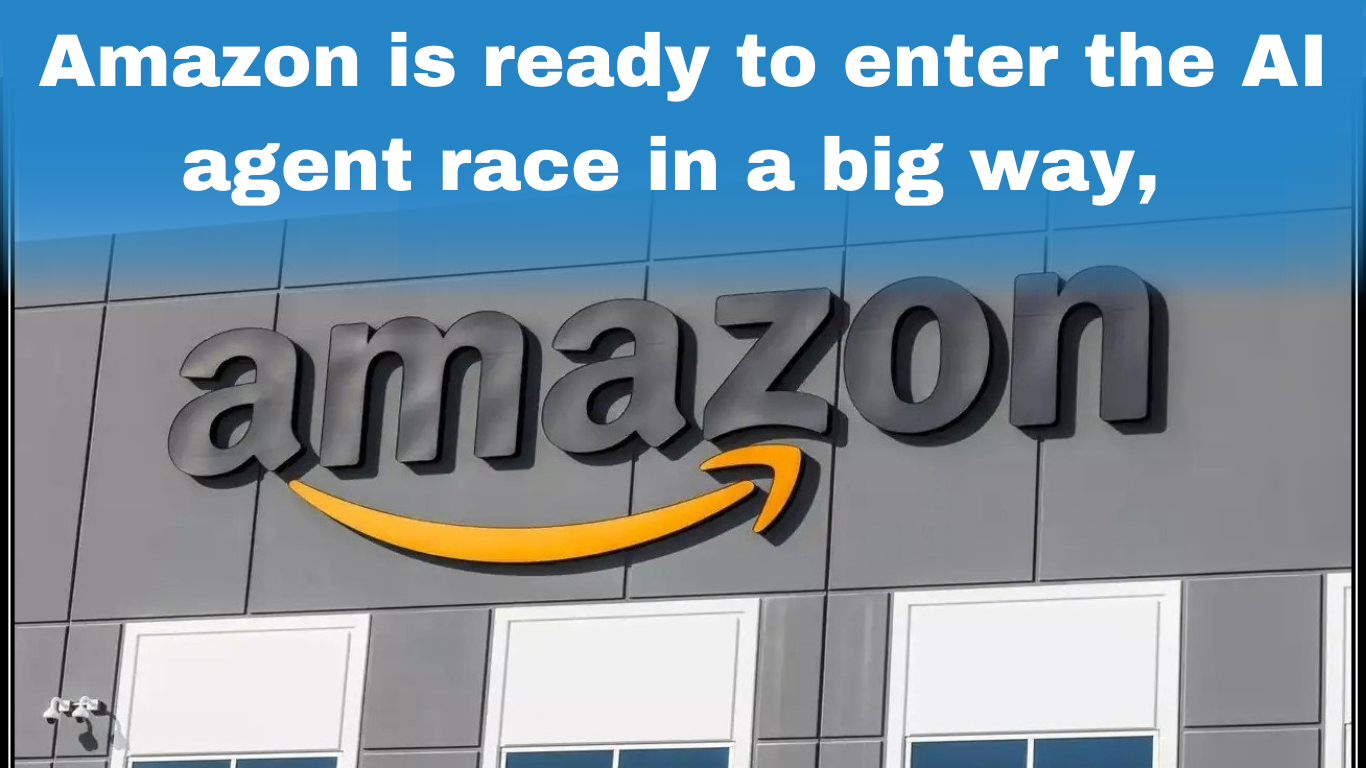Amazon is entering the AI agent race in 2025 with bold plans to transform industries, from retail to cloud computing. With Alexa, AWS, and enterprise-focused AI tools, Amazon aims to compete with Google, Microsoft, and OpenAI. Here’s a detailed look at what this move means for consumers, businesses, and the future of AI.
Table of Contents
Introduction
The year 2025 is shaping up to be the most competitive era in artificial intelligence yet. While OpenAI, Google DeepMind, Anthropic, and Microsoft have dominated headlines in the AI agent race, Amazon is now preparing to enter the battlefield in a big way. With its unmatched cloud infrastructure (AWS), massive e-commerce empire, and Alexa’s global footprint, Amazon’s entry is not just a new competitor—it’s a game-changer.
But what does this really mean for the AI industry, developers, businesses, and everyday consumers? Let’s break it down in detail.
What Are AI Agents, and Why Is Everyone Racing?
Before diving into Amazon’s big move, it’s important to understand what AI agents actually are.
- AI Agents are advanced artificial intelligence systems designed to act autonomously.
- Unlike simple chatbots, AI agents can understand goals, take actions, and continuously learn from results.
- They can handle everything from booking a flight and managing a team’s tasks to running automated workflows in a business.
In short, AI agents are the next big leap after generative AI (ChatGPT, Bard, Claude). Whoever wins this race could shape the future of digital assistants, workplace automation, and even customer service ecosystems.
Why Amazon Entering the AI Agent Race Matters
Amazon has been a quiet giant in AI. While others focused on chatbots, Amazon was experimenting with Alexa, AWS AI services, and retail data-driven machine learning. Now, in 2025, it seems ready to leverage these three pillars:
- AWS (Amazon Web Services): The backbone of the cloud, with massive AI computing capacity.
- Alexa Ecosystem: Already present in millions of homes and offices.
- Retail + Logistics Data: Amazon has decades of customer and supply chain data—gold for AI agents.
This means Amazon won’t just enter the race—it could reshape it.
Amazon’s Strategic Advantages in the AI Race
| Amazon Strength | AI Impact in 2025 |
|---|---|
| AWS Cloud Infrastructure | Provides computing power for AI training, making Amazon the preferred platform for developers. |
| Alexa User Base | Potential to upgrade Alexa into a true AI agent capable of advanced tasks. |
| E-Commerce Ecosystem | Enables personalized AI shopping assistants and automated logistics. |
| Prime Membership | Creates a testbed for consumer-facing AI services. |
| Global Reach | 310M+ customers worldwide, ensuring rapid AI adoption at scale. |
How Amazon Could Disrupt the Market
1. Transforming Alexa Into an AI Agent
Imagine Alexa no longer just setting timers or playing songs but:
- Managing your work calendar,
- Shopping proactively for groceries,
- Negotiating energy bills, or
- Acting as a personal financial advisor.
Amazon’s investment in large language models (LLMs) through AWS could power this transformation.
2. Business-Focused AI Agents Through AWS
AWS already provides services like Bedrock and SageMaker for AI model training. In 2025, Amazon could launch enterprise-level AI agents that automate:
- Supply chain management,
- HR processes,
- Customer support systems.
This could put Amazon head-to-head with Microsoft’s Copilot strategy.
3. Retail & Logistics AI Agents
Amazon’s logistics network is unmatched. AI agents could manage warehouses, delivery routes, and customer service at a scale others can’t match. This integration of retail + AI agents is something Google or OpenAI can’t easily replicate.
Amazon vs Competitors: Who Has the Edge?
| Company | AI Agent Strengths | Challenges |
|---|---|---|
| Amazon | AWS, Alexa, Retail Data, Global scale | Needs to catch up in LLM innovation |
| DeepMind, Gemini AI, Search dominance | Weak consumer adoption of Assistant | |
| OpenAI | ChatGPT, strong innovation pipeline | Reliant on Microsoft infrastructure |
| Microsoft | Copilot across Office & Azure | Enterprise-focused, weaker consumer base |
| Anthropic | Safety-focused AI (Claude) | Smaller ecosystem, less scale |
Amazon’s advantage is ecosystem scale + infrastructure. Its challenge? Proving it can build AI models as powerful and safe as OpenAI or Google’s.
Potential Risks and Challenges for Amazon
Amazon’s entry won’t be without hurdles.
- Regulation: Governments worldwide are tightening AI rules.
- Trust & Privacy: With so much customer data, Amazon faces questions about privacy.
- Technical Catch-Up: Amazon must quickly bridge the innovation gap in LLMs.
- Competition Pressure: Google, Microsoft, and OpenAI already have strong footholds.
What This Means for Developers
For developers, Amazon’s entry means more opportunities:
- Cheaper AI infrastructure on AWS.
- Ready-made APIs for building AI agents.
- Integration with retail and logistics data for innovative startups.
But it also means more competition, as AI startups might face direct competition from Amazon’s own products.
What This Means for Businesses
Businesses should prepare for:
- AI-driven customer service replacing call centers.
- AI-powered logistics reducing costs.
- Better personalization in e-commerce through Amazon AI agents.
For small businesses, Amazon might offer plug-and-play AI solutions at affordable rates.
What This Means for Consumers
For everyday users, Amazon AI agents could:
- Shop on your behalf,
- Suggest personalized deals,
- Automate household tasks,
- Integrate seamlessly with Prime, Kindle, Alexa, and Amazon Music.
It could turn Amazon into not just a shopping platform but your personal life manager.
The Future of the AI Agent Race in 2025 and Beyond
The AI agent race will define the next decade of technology. Amazon’s entry makes the race more competitive, more innovative, and more unpredictable.
In 2025, we can expect:
- Convergence of AI + Cloud + IoT.
- Battle for consumer trust.
- Rapid evolution of personalized AI assistants.
Amazon’s scale ensures that it won’t just be a participant—it could become a leader.
Amazon’s AI Research Investments
Amazon has been quietly but heavily investing in artificial intelligence research for more than a decade. While companies like OpenAI and Google captured media attention, Amazon focused on infrastructure, machine learning models for AWS, and real-world retail applications.
- In 2024, Amazon announced billions of dollars in AI partnerships with startups.
- It has been training its own large language models (LLMs) optimized for enterprise use cases such as logistics, healthcare, and cloud computing.
- Unlike others, Amazon’s strength lies in scalable AI infrastructure—the foundation of long-term growth in the AI agent race.
How Amazon AI Could Reshape Industries
| Industry | Impact of Amazon AI Agents |
|---|---|
| Retail & E-commerce | Personalized shopping agents, automatic reordering, predictive recommendations. |
| Healthcare | AI-powered appointment booking, medical supply logistics, patient engagement assistants. |
| Finance | Fraud detection, AI-driven personal financial advisors integrated with Alexa. |
| Entertainment | AI-curated Prime Video recommendations, AI script analysis for Amazon Studios. |
| Logistics | Automated delivery route optimization, drone fleet management with AI agents. |
Amazon’s ability to blend cloud, retail, and logistics gives it a competitive edge across industries.
Amazon’s AI Ecosystem: Beyond Alexa
While Alexa is the consumer face, Amazon’s AI play is much broader:
- AWS Bedrock: Provides foundation models as a service for businesses.
- Amazon Q: Business-focused AI assistant for workplace tasks.
- AI-Powered Robotics: Already active in warehouses for automation.
- Advertising AI: Personalized product ads based on consumer behavior.
This layered ecosystem strategy ensures Amazon’s AI isn’t just about assistants—it’s about building an AI-powered economy.
The Consumer Perspective: What Changes in Daily Life?
Consumers may not realize it, but Amazon AI agents could quietly become part of everyday living.
- Shopping lists created automatically by analyzing purchase history.
- Alexa booking not only flights but hotels and local activities.
- Voice-based health consultations linked to pharmacy deliveries.
- AI home energy managers controlling smart devices to cut costs.
Essentially, Amazon could become the personal assistant for life, blurring the lines between shopping, work, and daily routines.
Investor Angle: Why Wall Street Is Watching Amazon AI Closely
Investors see Amazon’s entry as a long-term revenue driver.
- AI services in AWS could add billions to recurring revenue.
- Retail AI personalization may boost conversion rates by double digits.
- Early adoption of AI agents in logistics could reduce Amazon’s delivery costs significantly.
Analysts predict that by 2030, Amazon could earn more from AI-driven services than from retail itself.
Challenges Ahead: Why Amazon Must Be Careful
Even with its strengths, Amazon faces hurdles:
- Public Trust Issues: Will customers allow Amazon AI to manage sensitive data?
- Regulatory Risks: Global governments are already drafting AI usage restrictions.
- Late Entry Concerns: OpenAI, Microsoft, and Google have a head start.
- Execution: Scaling AI agents to billions of users without failures is a huge task.
Future Outlook: Amazon’s Role in the Next 5 Years
Looking ahead, Amazon is likely to:
- Upgrade Alexa into a full-fledged AI agent.
- Launch enterprise AI agents via AWS for supply chain, HR, and finance.
- Integrate Prime services into AI workflows (Prime Video, Kindle, Shopping).
- Expand into Tier-2 and Tier-3 cities globally to push AI adoption at scale.
Additional Deep-Dive Table: Comparing AI Agent Capabilities (2025)
| Feature | Amazon (2025) | Google (2025) | OpenAI (2025) | Microsoft (2025) |
|---|---|---|---|---|
| Consumer Reach | 310M+ Prime users, Alexa devices | Android ecosystem, Google Search | ChatGPT consumer platform | Office Suite integration |
| Enterprise Solutions | AWS Bedrock, SageMaker AI agents | Google Cloud AI | APIs, ChatGPT Enterprise | Microsoft Copilot |
| Strength | Retail + Cloud synergy | LLM innovation, search dominance | Innovation, early mover | Enterprise adoption |
| Weakness | Late mover, trust issues | Adoption lag in Google Assistant | Limited ecosystem | Weak consumer presence |
Conclusion
Amazon entering the AI agent race in 2025 is not just another tech headline—it’s a seismic shift in the AI landscape. With AWS’s infrastructure, Alexa’s ecosystem, and unmatched retail reach, Amazon has the power to reshape how AI agents impact both businesses and daily life.
The real question is not whether Amazon can compete—but whether competitors can keep up.
FAQs
Q1. What is Amazon’s role in the AI agent race?
Amazon is leveraging AWS, Alexa, and retail data to launch advanced AI agents for businesses and consumers.
Q2. How will Alexa change in 2025?
Alexa could evolve from a voice assistant into a true AI agent capable of managing work, shopping, and home tasks.
Q3. How does Amazon compare with Google or OpenAI?
Amazon has scale and infrastructure, while Google and OpenAI lead in pure AI innovation. The race is about ecosystem power.
Q4. Will Amazon AI agents affect jobs?
Yes, especially in customer service and logistics, but they may also create new AI-related job opportunities.
Q5. What should businesses do to prepare?
Start exploring AWS AI services and prepare for AI-driven workflows to stay competitive.
Stay updated with the latest news and alerts — follow us at racstar.in











